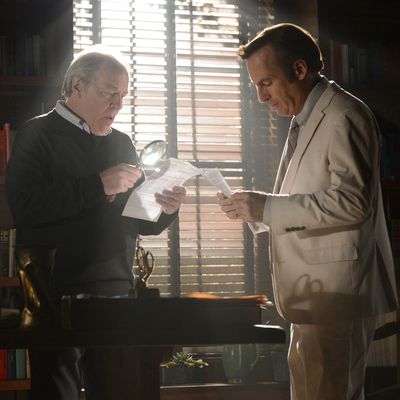
You had to wonder about Jimmy and Chuck’s relationship. I did, at least. For seven episodes, they’ve snuck around each other, Jimmy crashing on Chuck’s couch and hiding his newspaper, Chuck rifling through Jimmy’s files — actions that stand in for conversations the brothers seem unable to have. Even the matter of Chuck’s position with Hamlin — Hamlin McGill is more transparently discussed between Jimmy and Howard than Jimmy and Chuck, who seems too scared to face the future with anyone, let alone a hapless kid brother he still thinks of as a con.
Here they come together like a buddy comedy: The reluctant genius stirred from his cave, and a scrappy ally who might not have the same book smarts but sure knows how to move people around. It’s Jimmy who discovers the malfeasance at the assisted-living home, of course — a stray comment from one of his clients inspiring him to scratch away like a dog who catches the glimmer of something shiny in the dirt — but it’s Chuck who builds the case into something fearsome.
Jimmy doesn’t really think like a lawyer, at least not to the degree that Chuck does. Once he seizes on the idea that Sandpiper is cheating its residents, he seems to get lost in humanistic concerns, in morals and ethics. The irony, of course, is that Jimmy came to elder law not because he had a bleeding heart but because he saw a professional opportunity, and yet it’s clear from the ways we’ve seen him waltzing through those cafeterias and reading those bingo numbers that the job has become part of a much bigger and more complex project in which Jimmy makes himself whole.
As an actor, Michael McKean has a natural arrogance that I find endearing; he seems to putter above his scenes as though he were in a hurry to get back to his book. Odenkirk, on the other hand, seems pathetic even when things are going well, flaunting his minor accomplishments and struggling to keep a smile on his face. Their chemistry — Odenkirk’s and McKean’s — has been suggested on other episodes but never as clearly as it was here, especially in the episode’s opening flashback, where a young Jimmy eagerly shows Chuck his acceptance letter from the New Mexico bar and Chuck tiptoes politely around it, not because he isn’t proud of Jimmy but because he seems to find joy a little bit embarrassing.
Watching the two of them in their suits, tag-teaming the Sandpiper’s lawyers into a little corner, was a cleaner moment of triumph than Jimmy making the “Metro” section; maybe the cleanest moment of triumph we’ve seen yet. Helpfully, the Sandpiper lawyers — led by Dennis Boutsikaris — seem warmer and less cutthroat than Chuck’s own colleagues, turning the situation from David versus Goliath into a kind of gentleman’s game. (“I’m at the opera,” Jimmy whispers to Boutsikaris from the dumpster outside Sandpiper’s office, to which Boutsikaris asks, curiously, but without too much condescension, what Jimmy is seeing.)
“Rico” takes place almost entirely in the dark: Chuck’s house, the dim apartment of Jimmy’s client, offices at night, the dumpster outside Sandpiper. Which is why it’s so effective to see Chuck at the end, reinvigorated by purpose, walking into the light. The show picks its hammy moments well.

